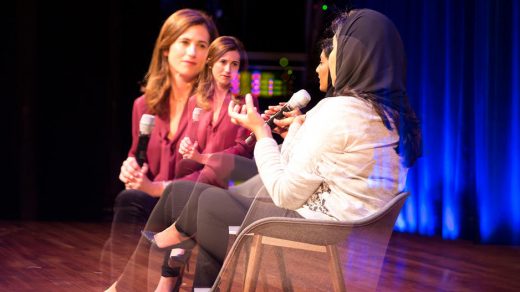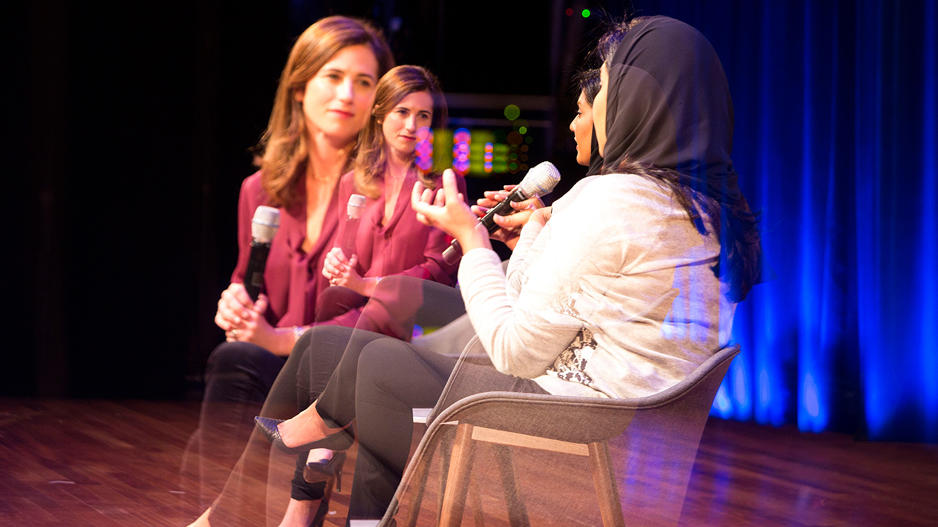How Sports Can Transform Saudi Arabia’s Economy and Culture
Princess Reema Bint Bandar Al-Saud remembers the moment she was asked to take the lead on a Saudi government program that oversees women’s participation in sports. That moment was so unexpected and meaningful, she remembers, that “I cried,” she said during an interview at the Fast Company Innovation Festival in New York. “I don’t even know why I cried.”
Princess Reema has long been a role model for Saudi women, becoming that country’s first-ever female CEO of a retail company, increasing employment opportunities for women, engineering a record-breaking gathering of women in the country, and even assisting in getting many women to the polls last year for the first time in their lives.
Now, as vice president for Women’s Affairs of the General Sports Authority in Saudi Arabia, Princess Reema believes there are many ways that athletics can be an economic boon. Until recently, women in Saudi Arabia have rarely been able to avail themselves of the kinds of public athletic facilities men take for granted.
Small Changes, Big Impact For Women’s Health
Princess Reema grew up in Washington, D.C., and speaks flawless English. To her, the sight of seeing men and women together at public athletic facilities, playing volleyball or basketball, is normal. But back home in Saudi Arabia, she said, there’s no such thing.
Until recently, many universities that have gyms didn’t even know they were technically allowed to let female students use those facilities. They needed formal letters from government officials to make them comfortable enough to open doors to those facilities to girls—a situation Princess Reema helped change.
For a long time at a local women’s university, just 8% of students were using high-tech sports facilities, Princess Reema said, but the school’s administrators had no idea why. Turns out they were wearing skirts, which was making it nearly impossible for them to utilize exercise machines. Wardrobe requirements in universities is an issue she and the ministries are currently discussing.
“I’m worried about the capacity of individuals who think it’s okay to [use exercise machines] wearing a skirt,” Princess Reema said, only half-joking.
Making changes to a system like that is an example of “low-hanging fruit,” she explained, that can help encourage a culture of health and wellness in a country which, like other rich economies, is struggling with dangerous levels of obesity and diabetes. “Obesity and diabetes are killing us,” she said. “If women do not have venues to exercise, that’s a national shame.”
Healthy Bodies Create Healthy Economies
Getting more women to work out has potentially lasting economic benefits as they become healthier and have to spend less of their money on medical care. Yet Saudi culture has resisted encouraging women to work out in public facilities because of fear that they will wear jogging shorts and other outfits that are seen as immodest, Princess Reema said.
Her solution? Licensing the operation of women’s gyms, something that requires overcoming societal fear, yet which is permitted under existing laws. Many Saudis don’t realize they are allowed to operate independent gyms that offer memberships to women.
An increased emphasis on sports can also generate new business opportunities for those with some ingenuity. While it’s hard to predict what those will be, she has at least one idea: bicycling. Amazingly, there are just two stores in Saudi Arabia that sell professional bikes, says Princess Reema. And that makes selling bicycles, parts, and clothing, a ripe area for expansion both as a hobby and professional pursuit. While there’s currently no way to scale the sport, she thinks that by working with the country’s Ministry of Trade it may be possible to let young entrepreneurs know that bicycling is something they can invest in. Not to mention, she joked, the riches that could come if someone invented a more comfortable bike seat.
Clearly, other sports could be mined for investment opportunities, too. The goal is to start a virtuous cycle of boosting Saudis’ health and reducing the drag on the economy as people spend less on health care, even as others pursue new sports-related ventures. And Princess Reema believes she has a role to play in getting that potential economic engine fired up. And she knows that while ambitious and effective people like her often want to go straight from idea to accomplishment, you first have to take the initial steps that set things in motion.
“If you look at each little domino you want to tip, and have all the dominos fall, my job is make the dominos fall,” she said. “But first set them up.”
Fast Company , Read Full Story
(16)














